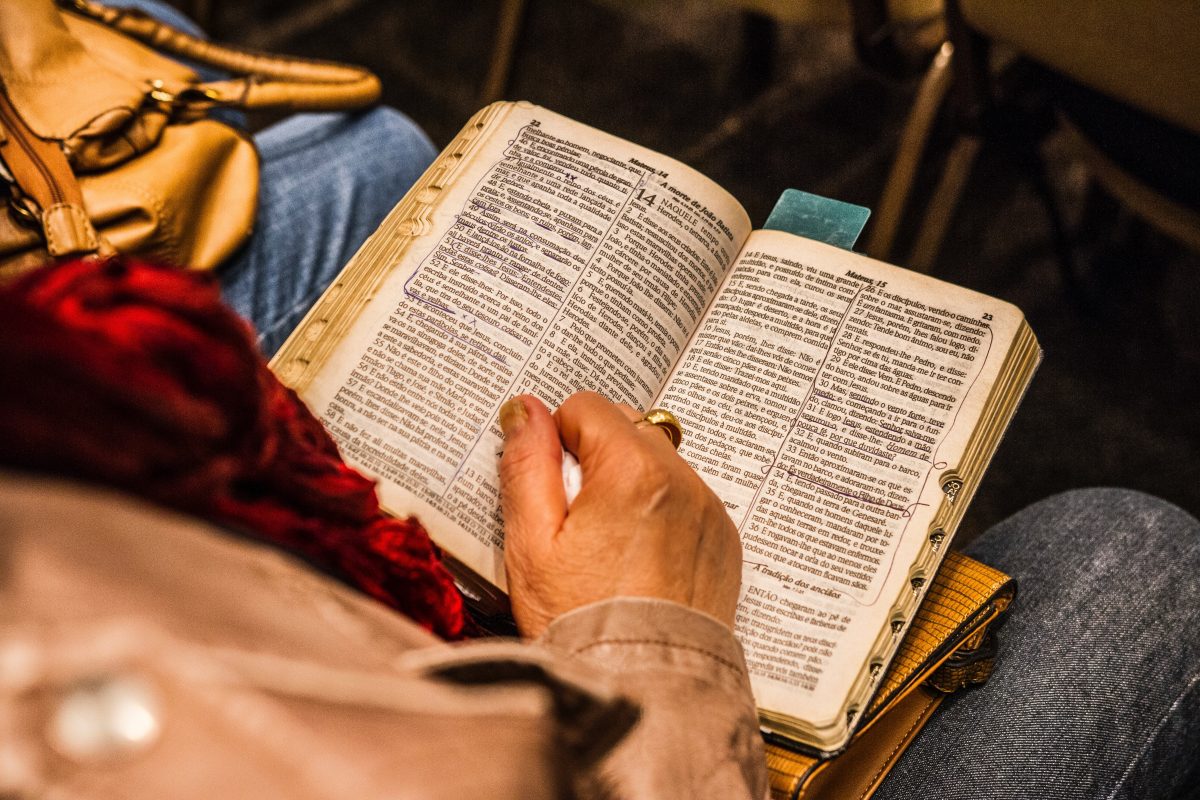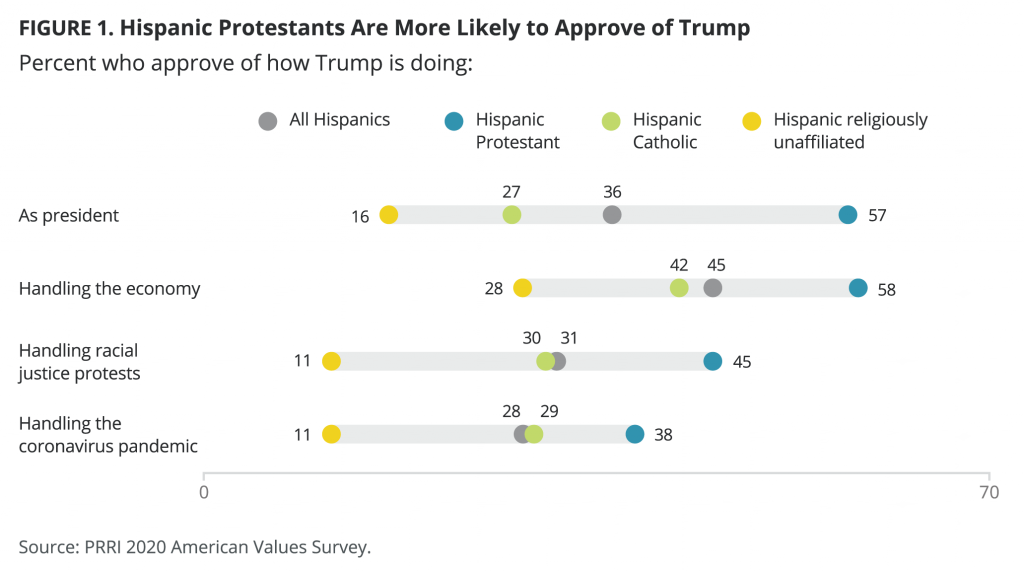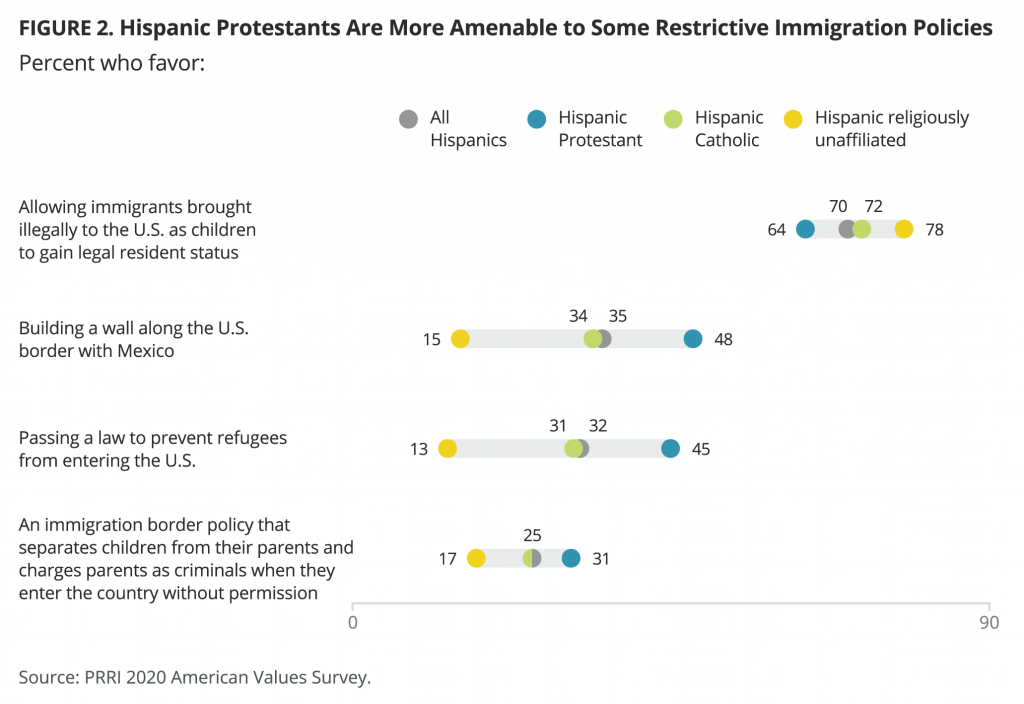Religion Divides Hispanic Opinion in the U.S.

Preliminary exit polling indicates that around one-third of Hispanic voters cast their ballots for President Donald Trump, and more than four in ten voted for Trump in the crucial state of Florida.[1] Trump’s performance among Hispanic voters in 2020 is likely better than it was in 2016, when exit polls showed that 28% voted for Trump nationally and 35% in Florida. These initial estimates might seem surprising to some, given many of Trump’s anti-immigrant stances and refusals to condemn white supremacy. However, a closer look at data from PRRI’s 2020 American Values Survey reveals that a sizable minority of Hispanic Americans concur with Trump’s views.
In PRRI’s data, 36% of Hispanic Americans approve of the job Trump is doing as president, compared to 63% who disapprove. When it comes to the economy, 45% of Hispanic Americans approve of Trump’s efforts. The president gets lower marks for his performance on the coronavirus pandemic (28% approve) and dealing with racial justice protests (31% approve), but notably, his approval numbers among all Hispanic Americans still hover near his approximate share of the Hispanic vote.
Interestingly, there are not significant gender or age divides among Hispanic Americans when it comes to support for Trump. There are, however, distinctions by religious affiliation. A majority of Hispanic Protestants approve of Trump’s job in office (57%) and his performance with the economy (58%). Hispanic Catholics and those who are religiously unaffiliated are considerably less likely to approve of the president’s job in office (27% and 16%, respectively) or his performance with the economy (42% and 28%, respectively)[2]. Hispanic Protestants are also more likely to approve of how Trump has dealt with racial justice protests than Hispanic Catholics or those who are religiously unaffiliated (45% vs. 30% and 11%, respectively).

The partisan and ideological makeup of those groups explain these differences. Among all Hispanic Americans, 37% identify as Democrats, 25% as independents, and 21% as Republicans. Hispanic Catholics closely mirror that, with 41% identifying Democrats, 20% as independents, and 19% as Republicans. Hispanic Protestants are less likely to identify as Democrats (28%) and more likely to be Republicans (32%) or independents (31%). Religiously unaffiliated Hispanics are much more likely to be Democrats (46%) than independents (22%) or Republicans (7%). Hispanic Protestants are much more likely to say they are ideologically conservative (39%) than Hispanic Catholics (19%) or those who are religiously unaffiliated (12%). There are not significant divisions between these religious groups by age or education.
These religious divides are apparent on some immigration issues, including Trump’s signature issues. Overall, 35% of Hispanic Americans support building a wall at the southern border with Mexico to keep immigrants out, but nearly half of Hispanic Protestants (48%), compared to 34% of Hispanic Catholics and 15% of Hispanics who are religiously unaffiliated, agree. Additionally, 45% of Hispanic Protestants support a law preventing refugees from entering the country, while 31% of Hispanic Catholics and 13% of religiously unaffiliated Hispanics say the same. There are limits, however. Hispanic Protestants are not more likely to support a policy of family separation at the border (32%) compared to Hispanic Catholics (25%) and all Hispanic Americans (25%), although they are more supportive of the policy than Hispanics who are religiously unaffiliated (17%). There are also not large differences by religious group regarding support for policies that allow children who were brought into the country illegally to gain legal status (DACA).

When it comes to race issues, Hispanic Protestants also take markedly different views than Catholics and the religiously unaffiliated. Hispanic Protestants (44%) are less likely than all Hispanic Americans (60%), Hispanic Catholics (68%), and religiously unaffiliated Hispanics (73%) to say that Trump has encouraged white supremacist groups. Hispanic Protestants are also more likely to say that police killings of Black Americans are isolated incidents (50%) than Hispanic Catholics (33%) and those who are religiously unaffiliated (22%). There are not, however, significant differences in agreement that generations of slavery and discrimination have left Black Americans disadvantaged; majorities of all Hispanic groups agree.
There are also no differences between Hispanics by religion regarding discrimination faced by Black, Hispanic, Asian, or white people. However, Hispanic Protestants (52%) are more likely than all Hispanics (37%), Hispanic Catholics (29%), and religiously unaffiliated Hispanics (26%) to say that Christians face a lot of discrimination. The only other religious group among whom a majority agrees that Christians face a lot of discrimination is white evangelical Protestants (66%).
The differences between Hispanic Protestants, Catholics, and those who are religiously unaffiliated persist through many questions in the survey, with Hispanic Protestants notably more pro-Trump, conservative, and Republican than Catholics or those who are religiously unaffiliated. Religion is the largest demographic divider among Hispanic Americans, excepting only partisanship, and the data shows clearly that many have views that align with Trump and the Republican Party. It should come as no surprise, then, that many voted in that direction.

